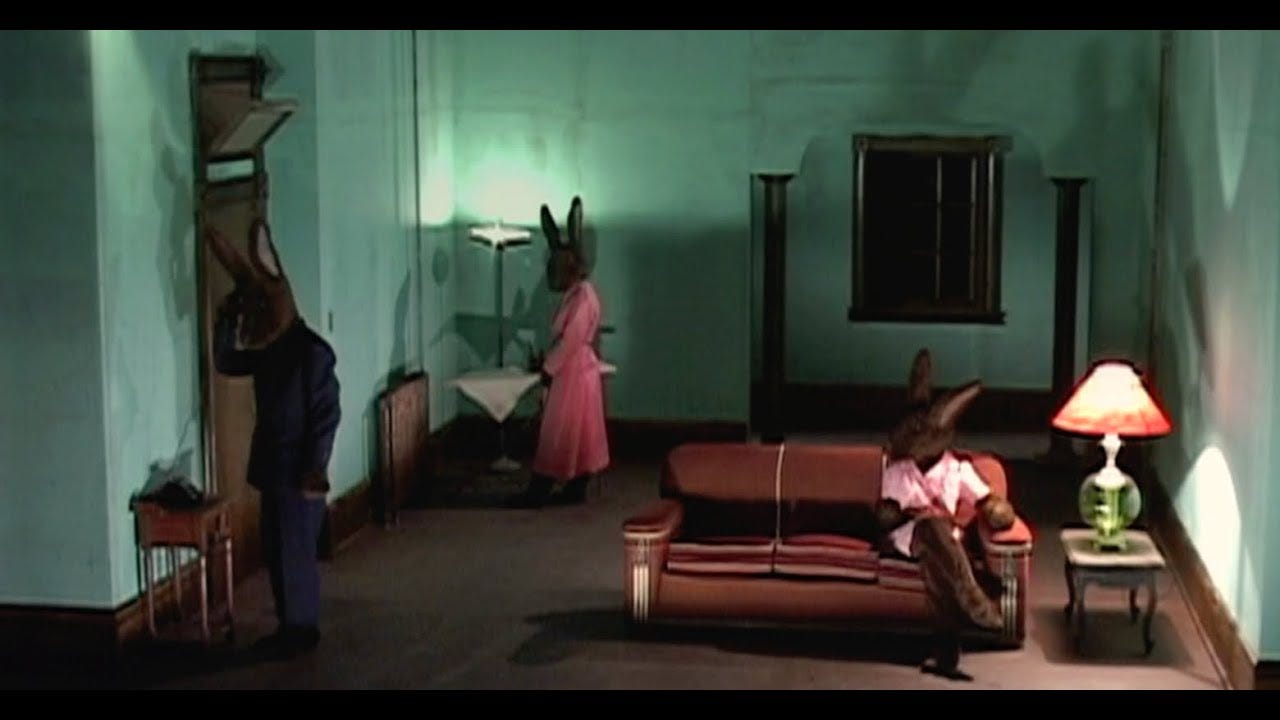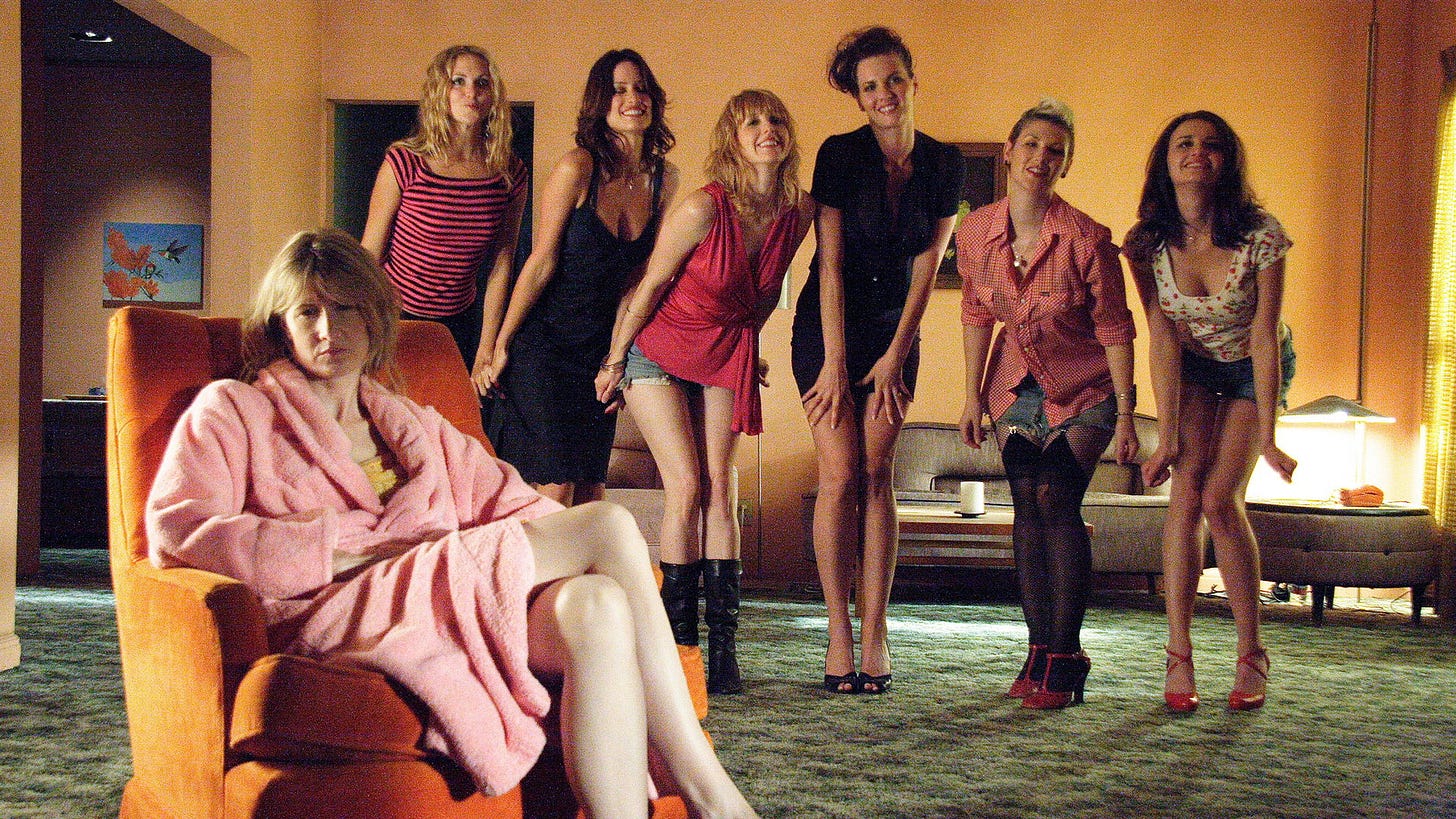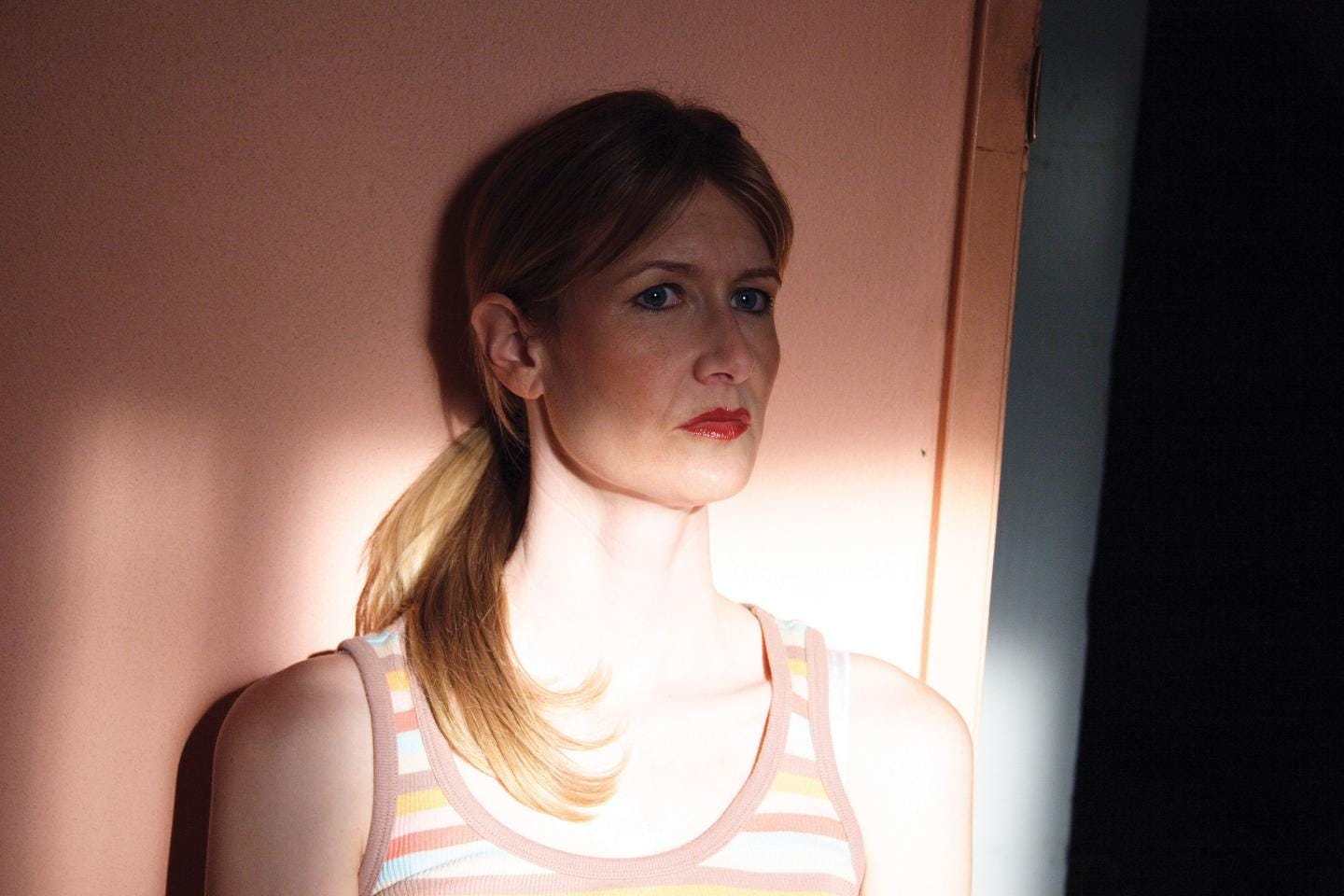Directed by David Lynch
USA/Poland, 2006
Inland Empire was insane... a culmination of David Lynch’s work: horror, dreams, and other worlds – T
We had to get there eventually. This week we have a David Lynch film and Inland Empire really is purest, unadulterated Lynch. If Mulholland Drive was an americano, Lost Highway must be a macchiato. Well, with Inland Empire you are getting a double espresso of cinema.
What makes Inland Empire so difficult, yet compelling, is that it pushes further on what we consider the possibilities for a film, even though it is one made by David Lynch. He loosens the typical anchors of the medium, which has two outcomes: on the one hand, Inland Empire at moments feels incoherent and certainly alienating to the unsuspecting viewer; but then by relaxing that grip, setting free any sense of time, place, and linearity the film has a much greater dramatic and at times, overwhelming emotional impact. Mulholland Drive is certainly a masterpiece, but watching it is like wading in the low tide compared to Inland Empire where you will feel completely lost at sea.
Inland Empire is the Finnegans Wake of film – S
Yet, when asked if Inland Empire makes narrative sense, David Lynch’s response was a straightforward yes. There is a storyline to find amid the fractured timelines. In fact, there are three interwoven strands: first, an actress Nikki Blue, played by Laura Dern, wins a lead role in a new film alongside Devon (Justin Theroux), a Southern Gothic melodrama. This film, On High in Blue Tomorrows – the second strand, is a remake of an earlier German production, itself based on a Polish folktale, that turned out to be cursed: both lead actors were murdered. Are you still with us?
In both ‘reality’ and in the film, where Nikki and Devon play Susan Blue and Billy Side, the co-stars embark on affairs with catastrophic consequences. The final and least comprehensible strand is set in Łódź, Poland: a young prostitute, ‘the Lost Girl’ (Karolina Gruszka), is kept prisoner in a room watching On High in Blue Tomorrows while ‘the Phantom’ who may or may not be her husband, is responsible for a number of killings.
To add to the confusion, depending on the film’s platform or media, the Polish scenes may or may not have subtitles…but hey, it’s a David Lynch movie
I said the least comprehensible strand but that’s not quite accurate. We are also treated to a series of bizarre interludes featuring anthropomorphic rabbits from a sitcom…with canned laughter.
An early scene in the film sets the tone and will certainly stay with you. A mysterious woman claiming to be her neighbour (Grace Zabriskie – last seen in Twin Peaks as Laura Palmer’s mother) visits Nikki to tell her she has the role in the new film. A claustrophobic and uneasy atmosphere is evoked by the too-tight facial close-ups and eccentric camera alignment. Stumbling over her words and speaking in a sort-of Polish accent she relates two tales about a girl and the boy:
A little boy
went out to play.
When he opened his door...
...he saw...
the world.As he passed through the doorway
...he caused, a reflection.
Evil was born,
and followed the boy.
She pauses, and continues:
And a variation:
A little girl...
went out to play.
...Lost in the marketplace...
...as if half born.Then, not through the marketplace,
you see that, don't you?
But through the alley
behind the marketplace.This is the way…
to the Palace.
But it isn't something you remember.
The neighbour then states that she cannot remember the time, she points her finger, and Nikki jumps through time and space to the following day. The phone rings and Nikki receives a call, informing her that she has been cast as Susan Blue.
Inland Empire is a dark and at times challenging watch. It requires patience but then themes do start to bleed through. Attempting to read the film for codes or clues seems reductive and to altogether miss the point – this really is cinema as experience. However, trauma across generations seems key. The tagline of Inland Empire is ‘A Woman in Trouble’ and each of the lead women in the three strands is trapped in repeating cycles of abuse, infidelity, and murder.
We have been here before with Lynch, notably in his TV series, Twin Peaks, and the film that followed (or preceded it?) Twin Peaks: Fire Walk with Me. ReidsonFilm has looked at the propensity of some great artists to return, again and again, to one dominant theme (see our review of Ozu and Late Spring), and without doubt David Lynch is a great artist. With Inland Empire he takes us even further, repeating iterations of that theme within one film.
Inland Empire demands you try to make sense of it. The film implies that everything seems to be there for a reason. And so you can’t switch off, you can’t check out. But you also can’t unravel the mystery - N
And the aforementioned rabbits? As would be expected with Lynch their role is ambiguous. These sequences are actually reworkings from a series of short films called Rabbits – what else? – where the characters are voiced by the stars of Mulholland Drive, Naomi Watts and Laura Harring.
"In a nameless city deluged by a continuous rain... three rabbits live with a fearful mystery"
Perhaps they are Gods overseeing the proceedings? We certainly seem to have what appears to be a Greek chorus, in the form of a group of Valley Girl prostitutes. When not providing a running commentary on events or articulating Susan’s inner thoughts, they are prone to breaking out into a song and dance act. David Lynch does the Locomotion by Little Eve, whatever next? Well…
When it comes to summoning an atmosphere of dread in domestic rooms or corridors, nobody holds a candle to Lynch: transforming them into the most liminal of spaces. He adds to this in Inland Empire by shooting in digital video. Not only that, he uses what looks like a cheap, off-the-shelf camera. This gives the frame a gritty, unpolished and at times repellent look. But that picture seems to improve over the course of the film and is an indication that we are heading, unexpectedly, toward what for Lynch is an unusually optimistic ending. It turns out that one of the characters, Susan, is prepared to break the cycles of anguish through an act of self-sacrifice.
Along with the moments of genuine horror this is a film with passages of haunting beauty that do linger in the mind. Only David Lynch could unironically show you a vagrant appearing as an angel to deliver a benediction:
I’ll show you light now
It burns bright forever
No more blue tomorrow’s
You on a high now love
This is all underpinned as usual by a score which combines jarring industrial sound design with lyrical choral music, much of it penned by Lynch himself.
Inland Empire could be Lynch’s final feature film. In many ways it feels like an homage to his previous work – including paradoxically Twin Peaks: The Return which came out 10 years later! These days while people speculate on the likelihood of another film, he is busy broadcasting recipes for cooking quinoa or putting out occasional weather reports on YouTube.
As well as echoes of earlier productions, we get to see many of Lynch’s repertory company of actors making an appearance: Naomi Watts, Justin Theroux, and the great Harry Dean Stanton. And of course, Laura Dern is at the centre of Inland Empire, with a fearless and exceptional performance: not only in playing two distinct roles, but also moving from satire to tragedy without ever veering into parody.
In what proved to be an unsuccessful attempt to secure Laura Dern an Oscar nomination for her performance Lynch parked himself on Hollywood Boulevard with a portrait of Dern which read ‘For Your Consideration’. Tethered alongside him was a cow.
Dern really is the ‘lynchpin’ of a film that will taunt, provoke, and intimidate you. However it really is worth your while, and if you make it to the end – it may require a couple of attempts – you will be rewarded with one of the great closing credit sequences in film, featuring both Natassja Kinski and Nina Simone.
After watching Twin Peaks: The Return, TV was never the same. After Inland Empire I can say the same about cinema - S
Reids’ Results (out of 100)
C - 91
T - 92
N - 95
S - 89
Thank you for reading Reids on Film. We hope you enjoyed our review and if you did please share with a friend and feel free to leave a comment.
And welcome to our new subscribers. If you want to take a look at our back catalogue, you can find it here: The Archive
Coming next… Neptune Frost(2021)









